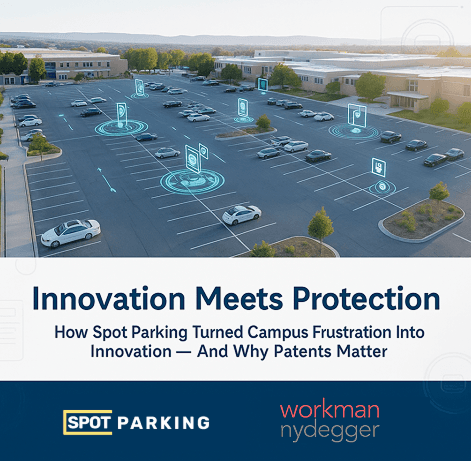
How Spot Parking Turned Campus Frustration Into Innovation And Why Patents Matter
Featuring Workman Nydegger’s role in protecting breakthrough ideas
In many college campuses, the endless loop of circling lots, hunting for a spot, and arriving late to class has become a rite of passage. But what if that pain point could be turned into a business one that not only simplifies parking, but rethinks it altogether? That’s exactly what Spot Parking did, and in doing so, they showed how smart innovation combined with intellectual property strategy can turn frustration into a scalable solution.
The idea for Spot Parking started in a familiar place overcrowded student parking lots, limited spaces, and frustrated drivers. What began as a simple parking locator concept soon evolved into a vision for modernizing campus parking enforcement and management. As highlighted in a Spotlight article by Workman Nydegger, the team recognized a greater opportunity to create a smart, scalable platform that required both technical innovation and strong intellectual property protection.
Why patents matter in parking tech
When you’re building a solution that uses sensors, software, user-interfaces, data flows and analytics (as many smart parking systems do), you’re operating in a competitive, crowded space. The more you delay thinking about type of protection you need, the more risk you invite: copycats, platform risk, licensing pressures.
Workman Nydegger emphasises:
- “A patent is a powerful mechanism for protecting your invention … It can not only help protect your work but can provide a tremendous competitive advantage.” Read full article →
- “Understanding the importance of protecting their innovation … the Spot Parking team prioritized intellectual property early, filing patents with expert guidance.” Read full article →
Workman Nydegger, a Utah-based IP law firm, positions itself as “artisans of our craft” in building IP assets and litigating IP interests. Workman Nydegger. Their patent service line covers everything from search and application to monetization and licensing.
If you work in tech, operations, campus logistics, smart city infrastructure or you’re a founder the lessons here are clear:
- Start by deeply understanding a real pain point (in this case: parking).
- Validate with users (students, campus admins).
- Build the solution. But before you scale, ask: what needs protecting? What patent filings should we consider?
- Partner with IP counsel who understands both technology and business strategy, not just form-filling. Use the patent (or IP asset) not just defensively, but as a proactive business lever (licensing, commercialization, partnership).
Every startup faces the same challenge: turning a big idea into something defensible and scalable and partnering with experts who understand their vision.